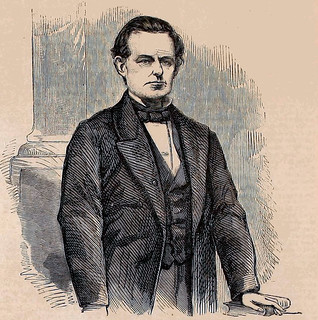Harper’s Weekly, January 19, 1861
W E publish on page 33, from a photograph sent us from Charleston, South Carolina, a portrait of Judge Magrath, late Judge of the United States District Court at Charleston. Judge Magrath is a lawyer of high standing at the South Carolina bar, and enjoys the respect of the public. He has hitherto taken no leading part in politics outside of his State; but in the Convention he was reckoned one of the strongest men, and is now one of the Executive Council of the new nation of South Carolina. The first act which directed public attention to him was his resignation of his office on 7th November last. On that day, when the Grand Jury reported that there was no more business before them, Judge Magrath said :
E publish on page 33, from a photograph sent us from Charleston, South Carolina, a portrait of Judge Magrath, late Judge of the United States District Court at Charleston. Judge Magrath is a lawyer of high standing at the South Carolina bar, and enjoys the respect of the public. He has hitherto taken no leading part in politics outside of his State; but in the Convention he was reckoned one of the strongest men, and is now one of the Executive Council of the new nation of South Carolina. The first act which directed public attention to him was his resignation of his office on 7th November last. On that day, when the Grand Jury reported that there was no more business before them, Judge Magrath said :
“The business of the term has been disposed of. And under ordinary circumstances, it would be my duty to dismiss you to your several avocations, with my thanks for your presence and aid. But now I have something more to do; the omission of which would not be consistent with propriety. In the political history of the United States an event has happened of ominous import to fifteen slave-holding State:. The State of which we are citizens has been always understood to have deliberately fixed its purpose, whenever that event should happen. Feeling an assurance of what will be the action of the State, I consider it my duty, without delay, to prepare to obey its wishes. That preparation is made by the resignation of the office I have held. For the last time I have, as a Judge of the United States, administered the laws of the United States within the limits of the State of South Carolina. While thus acting in obedience to a sense of duty, I can not be indifferent to the emotions it must produce. That department of government which, I believe, has best maintained its integrity and preserved its purity, has been suspended. So far as I am concerned, the Temple of Justice, raised under the Constitution of the United States, is now closed. If it shall be never again opened, I thank God that its doors have been closed before its altar has been desecrated with sacrifices to tyranny. May I not say to you that in the future which we are about to penetrate, next to the reliance we should place in the goodness of that God, who will guide us in the right way, should be our confidence in our State, and our obedience to its laws. We are about to sever our relations with others, because they have broken their covenant with us. Let us not break the covenant we have made with each other. Let us not forget that what the laws of our State require becomes our duties. And that he who acts against the wish or without the command of his State usurps that sovereign authority which we must maintain inviolate. To you, gentlemen of the jury, I may speak as the representative of the juries with whom I have been connected: and to you I now give expression to that conviction I have always had, of the fidelity with which the responsible duties of jurors have been here discharged. To my brethren of the bar, whose uniform courtesy and aid have made my official intercourse and duties the sources of pleasure and instruction, I tender the assurances of my kind and grateful recollection. To the officers of this court, with whom I have been so long and pleasantly connected; to the Attorney of the United States for this State, whose ability and fidelity in the discharge of his duties merit the highest commendation; to the Marshal whose zeal has ever kept pace with the obligations of his office; to the Clerk, whose experience has ever been generously exercised in the business of the Court; to all other officers, who have invariably been exact in all they were required to do; with all of whom my official relations have been productive of the highest gratification: I now tender, as the last official act which I shall here discharge, my kindest wishes for their happiness and prosperity.”
At the conclusion of these remarks his Honor laid aside his gown and retired.